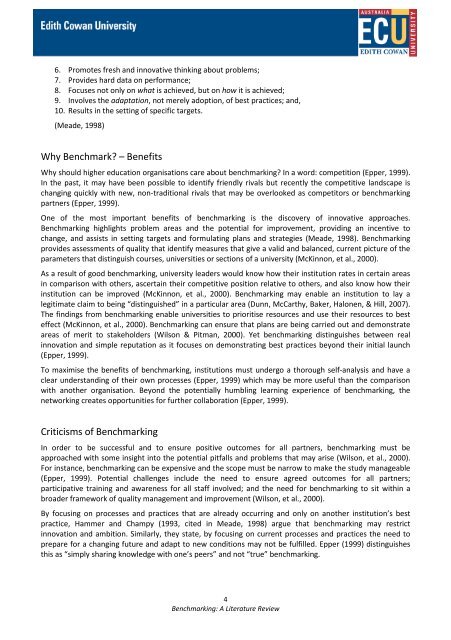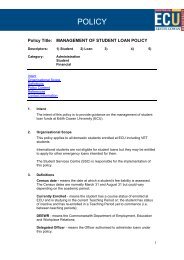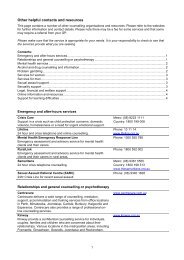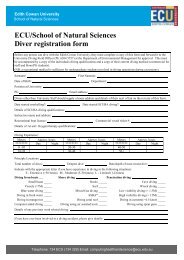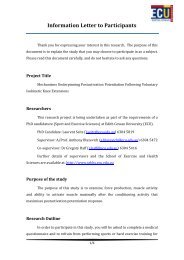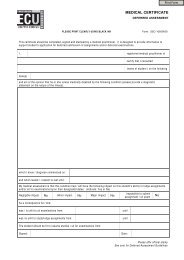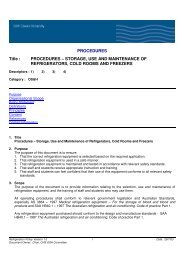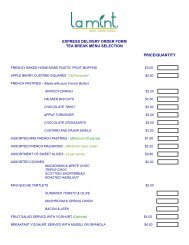Benchmarking: A Literature Review - ECU | Sign In : Portals - Edith ...
Benchmarking: A Literature Review - ECU | Sign In : Portals - Edith ...
Benchmarking: A Literature Review - ECU | Sign In : Portals - Edith ...
You also want an ePaper? Increase the reach of your titles
YUMPU automatically turns print PDFs into web optimized ePapers that Google loves.
6. Promotes fresh and innovative thinking about problems;7. Provides hard data on performance;8. Focuses not only on what is achieved, but on how it is achieved;9. <strong>In</strong>volves the adaptation, not merely adoption, of best practices; and,10. Results in the setting of specific targets.(Meade, 1998)Why Benchmark? – BenefitsWhy should higher education organisations care about benchmarking? <strong>In</strong> a word: competition (Epper, 1999).<strong>In</strong> the past, it may have been possible to identify friendly rivals but recently the competitive landscape ischanging quickly with new, non-traditional rivals that may be overlooked as competitors or benchmarkingpartners (Epper, 1999).One of the most important benefits of benchmarking is the discovery of innovative approaches.<strong>Benchmarking</strong> highlights problem areas and the potential for improvement, providing an incentive tochange, and assists in setting targets and formulating plans and strategies (Meade, 1998). <strong>Benchmarking</strong>provides assessments of quality that identify measures that give a valid and balanced, current picture of theparameters that distinguish courses, universities or sections of a university (McKinnon, et al., 2000).As a result of good benchmarking, university leaders would know how their institution rates in certain areasin comparison with others, ascertain their competitive position relative to others, and also know how theirinstitution can be improved (McKinnon, et al., 2000). <strong>Benchmarking</strong> may enable an institution to lay alegitimate claim to being “distinguished” in a particular area (Dunn, McCarthy, Baker, Halonen, & Hill, 2007).The findings from benchmarking enable universities to prioritise resources and use their resources to besteffect (McKinnon, et al., 2000). <strong>Benchmarking</strong> can ensure that plans are being carried out and demonstrateareas of merit to stakeholders (Wilson & Pitman, 2000). Yet benchmarking distinguishes between realinnovation and simple reputation as it focuses on demonstrating best practices beyond their initial launch(Epper, 1999).To maximise the benefits of benchmarking, institutions must undergo a thorough self-analysis and have aclear understanding of their own processes (Epper, 1999) which may be more useful than the comparisonwith another organisation. Beyond the potentially humbling learning experience of benchmarking, thenetworking creates opportunities for further collaboration (Epper, 1999).Criticisms of <strong>Benchmarking</strong><strong>In</strong> order to be successful and to ensure positive outcomes for all partners, benchmarking must beapproached with some insight into the potential pitfalls and problems that may arise (Wilson, et al., 2000).For instance, benchmarking can be expensive and the scope must be narrow to make the study manageable(Epper, 1999). Potential challenges include the need to ensure agreed outcomes for all partners;participative training and awareness for all staff involved; and the need for benchmarking to sit within abroader framework of quality management and improvement (Wilson, et al., 2000).By focusing on processes and practices that are already occurring and only on another institution’s bestpractice, Hammer and Champy (1993, cited in Meade, 1998) argue that benchmarking may restrictinnovation and ambition. Similarly, they state, by focusing on current processes and practices the need toprepare for a changing future and adapt to new conditions may not be fulfilled. Epper (1999) distinguishesthis as “simply sharing knowledge with one’s peers” and not “true” benchmarking.4<strong>Benchmarking</strong>: A <strong>Literature</strong> <strong>Review</strong>


